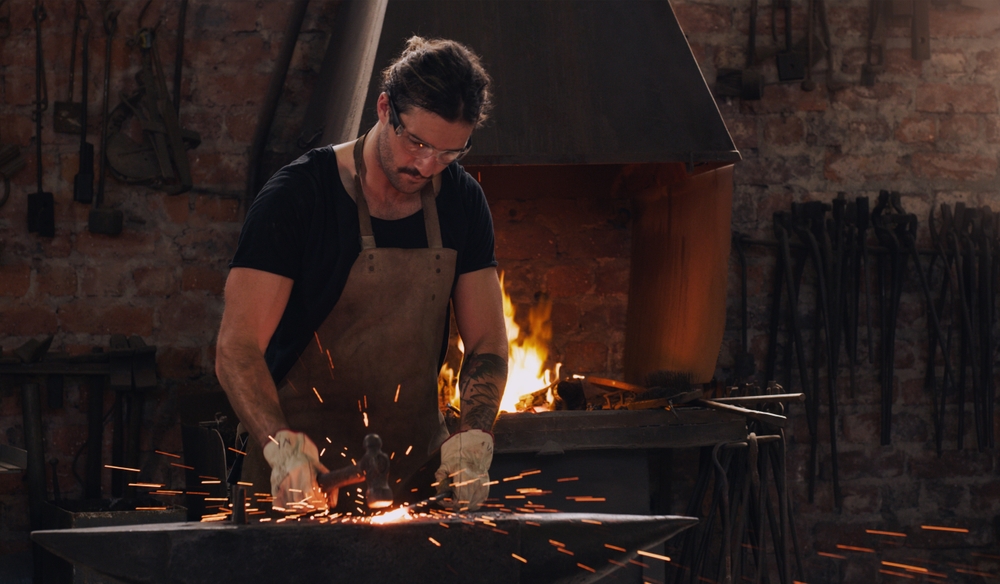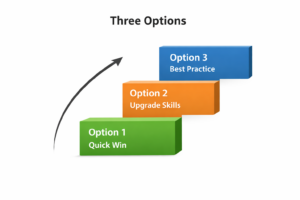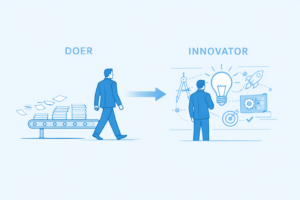Let’s start with a question: How do you feel about AI?
Excited? Nervous? Terrified? Dismissive?
Be honest. Do you think it’s all hype? A passing trend? Or are you watching it creep closer, wondering when it will touch your work, your career, even your daily life?
Here’s the thing: AI isn’t coming – it’s already here. And unlike previous waves of automation, which started by replacing repetitive, dangerous jobs, this one is coming straight for the highly skilled, the highly paid, the highly educated.
If you’re sitting at a desk, making decisions, designing, writing, negotiating, advising, persuading – AI is already in your space.
Change is Always Uncomfortable – But It’s Always Happened
Let’s take a step back.
Imagine you’re a blacksmith in the late 1800s. For centuries, your craft was essential. You shaped the world – horseshoes, tools, weapons, wagon parts. Then the car arrived. Not all at once, but slowly, steadily. Did you see it as an opportunity, or did you scoff at the “fad” and refuse to adapt?
Or picture yourself in the early days of the Industrial Revolution. You’re a weaver, working by hand, creating intricate fabrics with skill passed down for generations. Then factory machinery arrives. Some weavers riot (literally- hello, Luddites), some deny it will change their lives, and some? Some learn to use the machines and become more productive than ever.
Now fast forward…
- The printing press destroyed the need for scribes but gave birth to the modern publishing industry.
- The steam engine put thousands of manual labourers out of work, but created entire new industries.
- The car wiped out an entire economy built around horses, but made room for roads, mechanics, travel, logistics, and globalisation.
- The computer made entire professions obsolete – no more roomfuls of typists or human calculators – but gave us the digital economy.
And now? Now, we’re standing at another crossroads.
The Shape of the AI Revolution
This time, it feels different because it’s not just about replacing repetitive, manual work. It’s about augmenting, enhancing, and in some cases, outright challenging highly skilled work.
A recent study looked at 1,016 job categories and found only 36 had no overlap with AI. And those? Mostly hands-on, physical jobs – construction workers, roofers, dancers, hairdressers, nail salons.
Everyone else? AI is already overlapping with your work.
- Professors: AI can generate lesson plans, mark papers, tutor students.
- Marketers: AI can write ad copy, create social media content, analyse campaign data.
- Lawyers: AI can draft contracts, summarise case law, research legal precedents in seconds.
- Artists & Designers: AI can generate stunning visuals, concepts, and even music.
- Telemarketers & Salespeople: AI-generated voices are about to become indistinguishable from human ones. (have you heard my cloned voice?)
Meanwhile, mechanics, plumbers, and roofers are still largely untouched – for now.
But What About Robots?
You might be thinking, “Well, AI is still just software. It’s not taking over physical jobs anytime soon.”
That’s partially true– for now.
But robots are catching up. And AI is helping them get smarter, faster.
Meet Helix – a robotic system that is pushing the boundaries of real-world automation. Watch it here. Right now, we’re seeing robots go from dumb, repetitive machines to adaptive problem-solvers, thanks to AI-driven learning.
Today, it’s warehouse jobs. Tomorrow? Who knows?
So, What Are You Going to Do?
You have three choices:
- Embrace AI – Learn how to use it, leverage it, become the person who knows how to work with AI rather than being replaced by it.
- Investigate AI – Stay informed, test it, keep an eye on what’s happening so you’re not blindsided.
- Pretend AI Isn’t Happening – Ignore it, downplay it, hope it never affects you… and then scramble when it does.
The people who thrived in past technological shifts weren’t the ones who fought change. They were the ones who saw the change coming, adapted early, and found ways to use the new tools to their advantage. Right now, it’s still early, but the clock is ticking.
This Isn’t the End. It’s the Beginning.
Think AI is the final step? Think again.
Every major invention spawns more inventions.
- The printing press led to newspapers, novels, scientific journals.
- The steam engine led to trains, factories, industrialisation.
- Electricity led to radio, computers, the internet.
- The internet led to social media, e-commerce, the gig economy.
AI isn’t the end of innovation – it’s the start of another wave of it. AI tools will become more powerful, robots will become more adaptive, and new industries will rise that we haven’t even imagined yet.
Final Thought: The Future Won’t Wait for You
Whether you like AI or not is irrelevant. It’s happening.
So the real question is: What are you going to do about it?
Will you be the blacksmith who ignored the car? The weaver who smashed the machines? Or will you be the one who learned how to use the new tools and thrived?
Because AI isn’t going to ask for permission. It’s just going to keep moving forward.
Are you?






